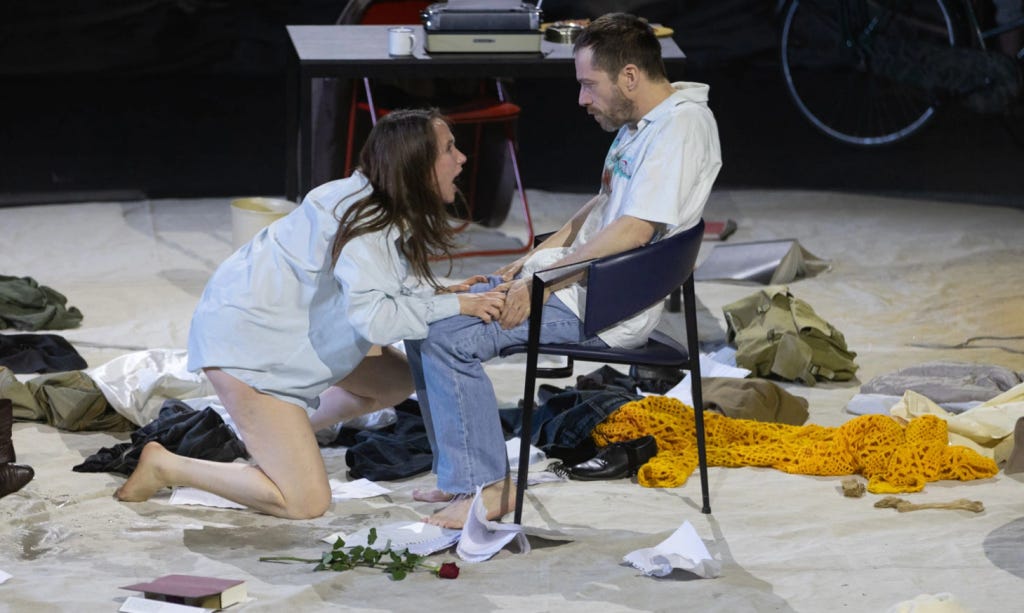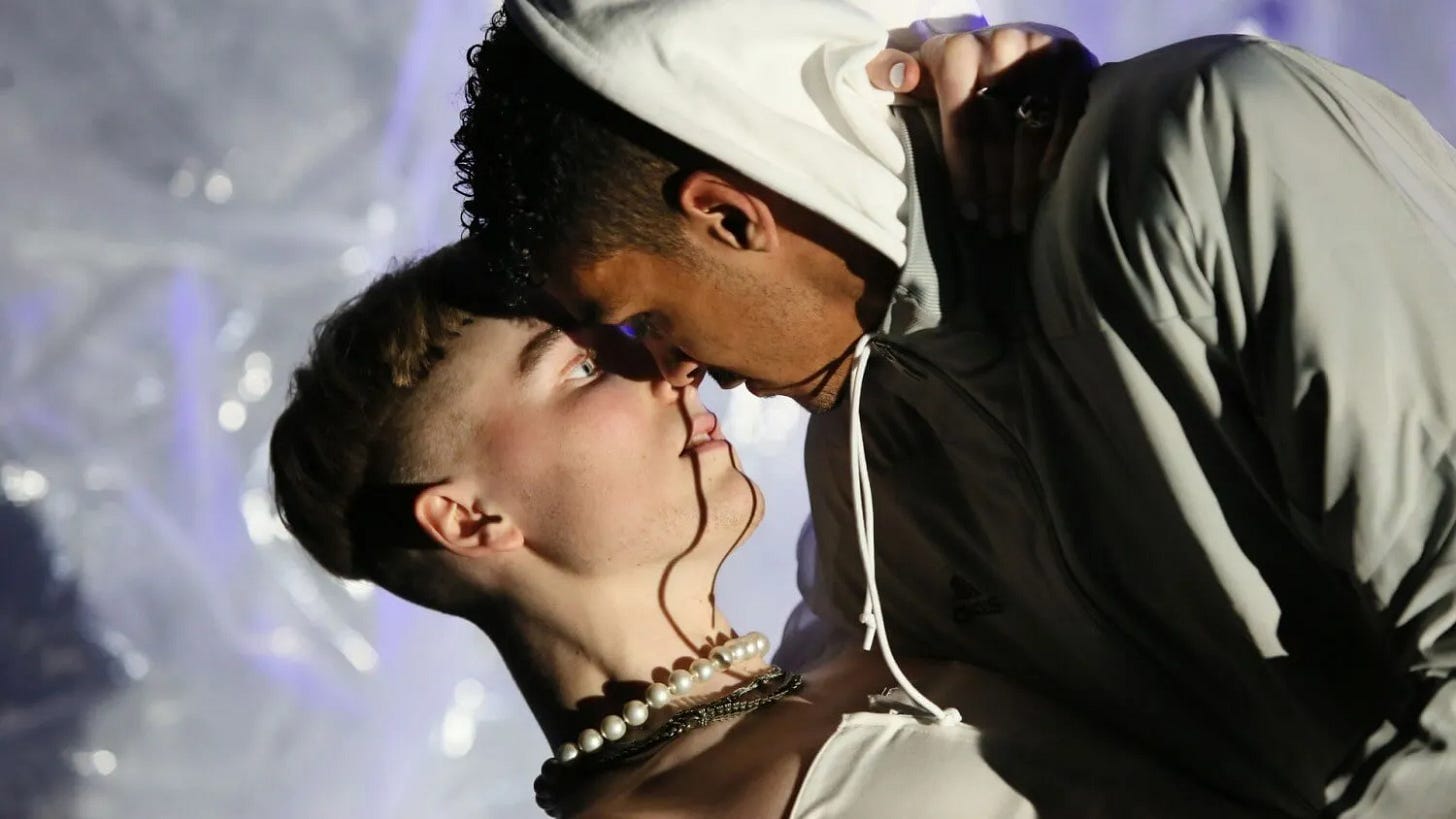The circle game: The sensuous, playful theatre of Eline Arbo
On the work of Internationaal Theater Amsterdam's new artistic director.
Welcome to Café Europa, a weekly newsletter dedicated to European theatre.
This week we’re Amsterdam, where in March I went to interview Eline Arbo, the new artistic director of Internationaal Theater Amsterdam, for the Guardian. We talked, among other things, about her new role and her thoughts on artistic leadership. While I was there, I had the opportunity to watch her most recent production, based on Connie Palmen’s popular Dutch novel, more on which below.
From the Arctic Circle to the top of European theatre: director Eline Arbo on being ‘an outsider looking in’
Here comes the usual plea - if you find this newsletter interesting or valuable, please consider sharing it or, if you or your organisation are able, becoming a paid supporter. I also have a Ko-fi account, if you want to support my writing this way.
In June last year it was announced that Ivo van Hove would be stepping down as artistic director of Internationaal Theater Amsterdam. His successor was named as Eline Arbo, a director from Norway who was already Associate Artistic Director at the theatre. Since then it has been announced that two of her earlier shows will play the UK this year, with her 2023 production of Penthesilea part of this year’s Edinburgh International Festival programme, and, perhaps even more interestingly, her production Annie Ernaux’s The Years is being presented in a new English version at London’s Almeida Theatre during August.
Weg met Eddy Bellegueule - skin songs
The first show of hers I saw was Weg Met Eddy Bellegueule, Arbo’s production of Édouard Louis’ much-adapted The End of Eddy, which was part of the 2022 EIF programme. In her staging of Louis’ autobiographical account about growing up gay in a working-class town in Picardy, Arbo makes the ingenious decision to fracture the protagonist between her track-suited four-man cast. Victor IJdens, Jesse Mensah, Felix Schellekens and Romijn Scholten all take turns to play Eddy while also playing the other roles, including Eddy’s hard-drinking father. Sometimes they are the bullies, sometimes the victims of bullying, shifting nimbly between the two.
Arbo’s staging is fantastically physical and fluid (in one scene very literally), the action playing out under a white-plastic parachute-like tent thingy that expands and deflates over the course of the show. Music pulses through the whole piece, with the cast performing songs by Ivo’s beloved Arcade Fire and, thrillingly for me, Radiohead. A scene of mutual masturbation is gloriously depicted by dimming the lights to reveal a carnival of UV spunk streaked across the actors’ skin. The potentially grim material is turned into something buzzing and funny, heady and sexy, and vital with the energy of a gig.
Writing in the Observer, Susannah Clapp called it “transcendent.” The cast of ridiculously charismatic musician-actors were a joy to watch, the audience flew to their feet at the end and Arbo picked up a VSCD (Vereniging van Schouwburg- en Concertgebouwdirecties) award for the production.
Arbo’s production of Penthesilea has a similar quality. It is a zesty and playful piece of theatre. Based on a text by Heinrich von Kleist, it foregrounds the story of the Amazon queen. played by Ilke Paddenburg, and her love for Achilles, taking a minor character in the Trojan wars and making her story central. Music plays a big role in this production too, as it does in all her work, not just one design element of many but a fundamental part of the show. There’s an onstage drumkit and the cast wield guitars. There are tender ballads and punky foot-stompers, the love story told as much through song as through dialogue. This review compares the show to Baz Luhrmann’s Romeo + Juliet in terms of its energy, and amusingly also suggests that Arbo has liberated the ITA ensemble, finally enabling them to cut loose.
Arbo’s first production since taking on the role of artistic director, was the Dutch version of Suzie Miller’s polemical Prima Facie, a play that, as previously discussed in this newsletter, has become a international phenomenon, with a new production seemingly opening in Europe every month.
In Arbo’s production, Maria Kraakman plays Tessa, the ambitious lawyer who finds herself experiencing the system from the other side after she is raped by a colleague. The one-woman show plays out on a stage surrounded on three sides by white frames from which pieces of paper are suspended, presumably symbolising the case files of assault victims, a visual reminder of the fact as one in three women will experience some form of sexual assault during her lifetime. Kraakman gives a fantastically physical performance, leaping on top of desks and striding around the stage, confident and comfortable with taking up space, before the scene of her assault, in which she woozily takes off her clothes and crawls near-naked across the floor, before retching over a toilet, diminished by her experience, spending the rest of the show in a shapeless t-shirt. Arbo ensures this solo piece is dynamic, flooding the stage with white light, the whole set elevating at one point, and Kraakman is incredible, going on a real physical and emotional journey across the course of the show.
The Laws - turn, turn, turn
Arbo considers her most recent production, The Laws, to be the concluding part of a loose trilogy, following earlier productions of Michael Cunningham’s The Hours as well as The Years. What links these texts? They’re arguably all about women figuring out who they are, and coming to better understand themselves, about developing a sense of self, about interiority and growth.
Written in 1991 by Connie Palmen, The Laws was a massive success in the Netherlands. It’s a book about which people have strong feelings and, speaking to Arbo, I get the impression that people often read it when they’re a similar age to the protagonist. Coming from Norway, however, she didn’t read it until relatively recently, which perhaps allowed her greater freedom to have her way with it.
The Laws charts the experiences of philosophy student Marie as she tries to find her own path through life while dreaming of being a writer. Marie is played with a mixture of warmth and life-hungry energy by Ilke Paddenburg, frequently cycling around the stage and often directly addressing the audience, confiding in us. This direct address is particularly effective in a novel that is all about finding one’s voice.
Marie encounters a series of people who she hopes will impart something to her, wisdom, a life lesson, the laws by which to live by. In the original novel, all of these people are older men, which some take as a critique of the patriarchy – men remain the lawmakers. Arbo and her dramaturg Peter Van Kraaij mix things up a bit so that Marie encounters two women as well.
Marie meets the Astrologer (Maarten Heijmans) after tumbling off her bike (there is a lot of onstage cycling in the show). They discuss her horoscope and what the stars have in store for her. The characters are all described like this, the Astrologer, the Philosopher and so on. The Priest (Steven Van Watermeulen) reveals himself to have particular appetites and Marie ends up twanging off his sock suspenders and caressing his feet as he groans with pleasure on the bed. Later, Marie asks the Physicist (Janni Goslinga) to educate her in the art of love, even though, according to her at least, there’s little she hasn't done in this respect. (Like a lot of what Marie says, you take
Things shift when Marie meets Eelco Smits’ Artist. For one thing, he sees her as a creative being, the writer she wants to be; he affirms her sense of herself as an artist, something which she - understandably - finds irresistible and much gleeful sex follows. Paddenburg and Smits fling off their clothes and caper round the stage in the altogether. In one brilliant moment, Marie holds a page of her manuscript over her bush, and he plants his face in it, hungrily. She then sticks pages of her thesis to her skin, and it only makes him want her more, and she him. Like Andrew Scott’s ‘hot priest’ in Fleabag, he even catches her breaking the fourth wall and calls her out on it. "What are you doing?" he asks as she’s talking to us.
It's hard to describe how fun – and funny – the sex scenes are, in the beginning at least, unselfconscious and deeply intimate, lusty and playful. It feels so refreshing to watch, and rare too; it made me aware of how sex on stage is hardly ever sexy, whereas Arbo’s work most definitely is - warm and soft and hot.
Marie can’t get enough of the Artist, to the point that she becomes increasingly dependent on him. She inserts herself under his shirt, as if to fuse herself with him, to become conjoined, to climb inside him; she tells him she wants to become "a disease you come to love." When he’s absent she becomes desperate and melancholy, forgetting to eat or properly look after herself. When he returns, she confronts him, sing-screaming an increasingly frantic version of You Make Me Feel Like Natural Woman at him (Paddenburg is magnificent in this scene, hilarious and sad and furious all at the same time). This febrile relationship with the Artist, who like many of the men Marie encounters, actually seems like a bit of a dick, nonetheless seems to be a catalyst in her own process of self-evolution.
Once again music plays a key role - with the composer and musician Thijs van Vuure, Arbo’s partner and regular collaborator, sitting on one side of the stage, playing the accompanying music live throughout underscoring her emotions.
One other connecting thread between the three productions in Arbo’s trilogy is the symbol of the circle. The Hours was played on a constantly revolving stage. In The Years, in which five actors of different ages portray the protagonist across the course of her life, a circle is marked on the floor. Roel Van Berckelaer’s set for The Laws consists of disk draped in canvas. A somewhat student-y bed sits at the middle of this and over the course of the production, the floor becomes increasingly more cluttered with stuff, with books, paper, discarded clothes, smashed plates, spilled food.
The show’s final image is one of liberation, as the edges of the canvas are gradually gathered up and all this mess, this debris, is hoisted ceilingward, leaving Marie below, free.
This week in European theatre
A round-up of festivals, premieres and other upcoming events over the next seven days.
Ulster American – As discussed in last week’s edition, British director Rikki Henry’s production of David Ireland’s provocative comedy Ulster American has its premiere at Berlin’s Schaubühne on 11th April.
Balkan Bordello – Blerta Neziraj directs a new version of Jeton Neziraj’s raucous Oresteia update, which she previously staged in an international collaboration with New York’s LaMama Theatre for Sweden’s Uppsala Stadsteater. It premieres on 13th April (you can read more about the production in this super SEEstage interview with the director by Duška Radosavljević).
Young Europe IV Festival - The European Theatre Convention (ETC) and SNG Nova Gorica in Slovenia are hosting a showcase of inclusive classroom plays created by emerging writers from nine ETC member theatres in eight countries, designed to be performed in schools for young audiences . The festival takes place from 17th-19th April.
Thank you for reading! You can contact me about anything newsletter-related on natasha.tripney@gmail.com





